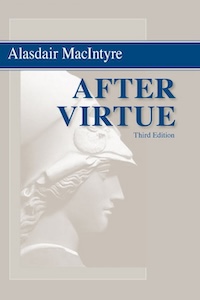After Virtue, Chapter 7
02 Nov 2025

After Virtue: A Study in Moral Theory, Third Edition
Alasdair MacIntyre
University of Notre Dame Press, 1981, 2007
Chapter 7 - deeper critique of the moral fiction of social science, the strategic split between “fact” and “value”
The concept of “fact” as pure sense-data, or whatever other “experience” prior to theory, is mistaken — all perception is theory laden (from Kant, but also echoes of Heidegger and phenomenology).
During the Enlightenment period, empiricism and natural science co-existed uncomfortably: Empiricism seeks to merge “seems” with “is” while natural science radically calls “seems” into question. Empiricism vindicates thru basic experience, while natural science vindicates thru theory. The Enlightenment worldview is thus hopelessly confused. But they all agree on the overthrow of Aristotle.
One critical Aristotelian idea that was overthrown was that of the telos — the end toward which each species moves, which could be considered its “good” — which has both sociological (explanatory) and ethical (normative) power.
But in the Enlightenment, man ceases to be a functional concept; action is explained by physiology, now divorced from normative ethics. So after this development, human action is now to be explained in the manner of mechanical generalizations, like Newton’s laws — antecedent conditions as sufficient causes (in case of condition x, a human will [always] y).
Problems:
1. Language must eliminate all references to beliefs, including reasons, purposes, etc. (Beliefs are complex and difficult to prove.)
2. Predictability paves the way for easier manipulation. But who is doing the manipulating, and how are we to characterize that particular agent (or worse, the subjective “I”)? Obviously not in the same way we characterize those being manipulated.
Despite these and other difficulties, the social “sciences” have believed themselves to be largely successful, and provide the supposed authority for all kinds of governmental and bureaucratic activity. This kind of activity has a direct lineage back to the original enlightenment reformers.